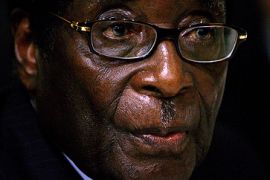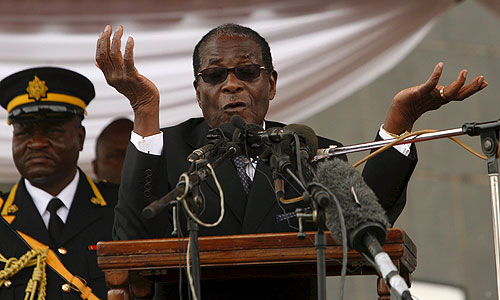Timeline: Zimbabwe’s power struggle
Key political events in country’s move towards unity government.

 |
| Mugabe has clung to the presidency since Zimbabwe’s independence in 1980 [EPA] |
Zimbabwean opposition party, the Movement for Democratic Change, has agreed to join a unity government with Robert Mugabe, Zimbabwe’s president, which could end the country’s political stalemate.
Here is an outline of events since Zimbabwe held elections on March 29, 2008.
March 30: Official results are delayed, but the MDC claims it is leading in presidential and parliamentary elections.
April 2: Results show that Mugabe’s Zanu-PF lost its parliamentary majority for the first time since Zimbabwe gained its independence in 1980.
May 2: An electoral body says that Morgan Tsvangirai, the MDC leader, has won the most votes in the presidential election, but not enough to avoid a run-off against Mugabe. The MDC challenges the result.
June 22: Tsvangirai pulls out of the run-off vote, citing attacks on his supporters which he blames on Mugabe’s Zanu-PF.
June 27: The run-off election goes ahead despite criticism from around the world. Mugabe, the only candidate, is declared the winner two days later and sworn in for a new five-year term.
July 25: Talks begin in South Africa between Zanu-PF, the MDC and a splinter faction of the MDC led by Arthur Mutambara. The talks, mediated by Thabo Mbeki, then South Africa’s president, later stall.
August 3: A second round of talks begin, but once again reach an impasse.
August 16: Leaders from the Southern African Development Community (Sadc) hold talks with Mugabe and Tsvangirai at a summit. Mbeki says that negotiations will continue.
September 9: Talks, mediated by Mbeki, begin again. It is proposed that Mugabe will remain as president and Tsvangirai will become Zimbabwe’s prime minister.
September 15: Mugabe and Tsvangirai sign a power-sharing agreement to try to end the crisis, but its implementation stalls over which parties will get top ministerial posts. Negotiations continue. Without being sworn in, Tsvangirai remains prime minister-designate.
January 27, 2009: Regional leaders say they have reached a breakthrough in negotiations. Some reports say the opposition is disappointed with results of the meeting, but a vote on whether to join the government is to go ahead within the MDC.
January 30: The opposition MDC agrees to join the unity government.
February 5: The parliament approves constitutional amendments which paves the way for a coalition government to be formed.
February 11: Tsvangirai sworn in as prime minister